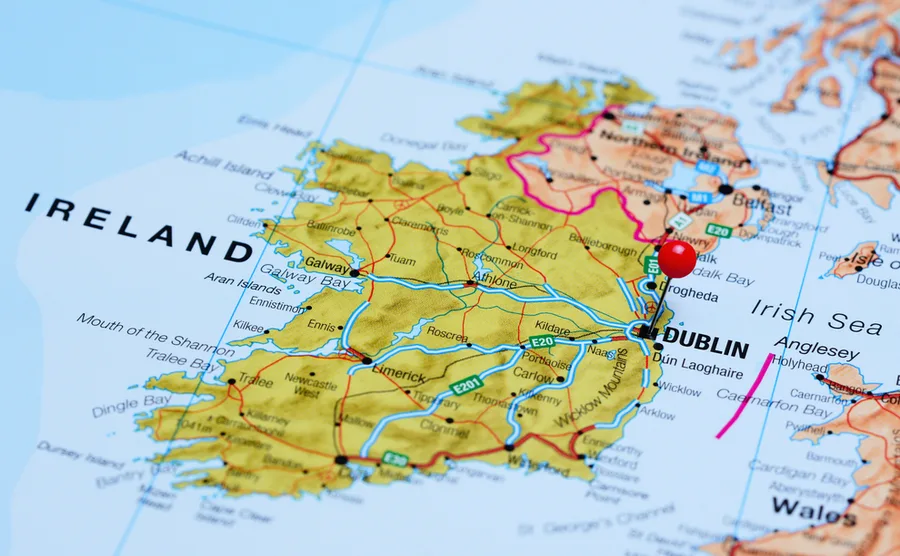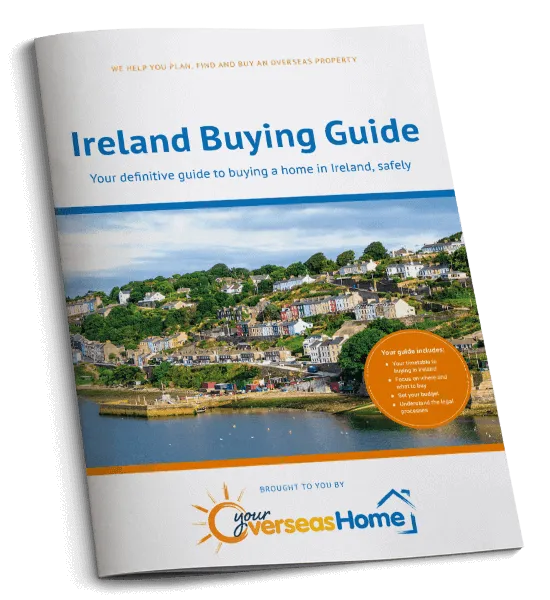Ireland and the United Kingdom have a long-standing agreement called the Common Travel Area. It predates both countries’ membership to the EU and therefore was not affected by Brexit.
The Common Travel Area (CTA), according to the British government, allows British and Irish citizens to move freely and reside in either jurisdiction and enjoy associated rights and privileges, including the right to work, study and vote in certain elections, as well as access to social welfare benefits and health services.

Ireland on a map
Both the Irish and British government signed a Memorandum of Understanding in 2019 which reaffirmed the states’ commitment to maintain the CTA.
However, there are restrictions that come with the CTA. So, we take a look at the key areas of concern for anyone moving to Ireland under the CTA agreement.

Dublin’s business quarter
Working in the Common Travel Area
The Common Travel Area allows British citizens to live and work in Ireland without needing permission from the authorities.
Key industries in high demand in Ireland:
- Technology
- Construction
- Accounting and finance
- Creative design
- Languages
- Business skills
- Web development
- Nursing
- Customer service
- Education
(Source: GrabJobs 2024)
A few key stats on working in Ireland: the average wage is $49,474 annually and around 68% or working-age people in Ireland are in employment. (source: OECD Better Life Index)
Please note, if you’re working in the CTA, you can only pay into one country’s social security scheme at one time. You are entitled, when not in your home state, to the same social security rights that you recieve at home.
Search for jobs in Ireland on jobs.ie
Education in the Common Travel Area
The CTA awards British and Irish citizens the rights to access all levels of education in both countries.
Should you wish to study higher education in the country in which you’re not a citizen, this remains possible. You have the right to qualify for student loans under applicable schemes and eligibility criteria.
Ireland performs well in the Better Life Index when it comes to education. The average student score in higher than the OECD’s average across other countries.

Doctor listens to a child’s heartbeat
Accessing healthcare in the Common Travel Area
So, you’ve moved to Ireland and fall ill, what now? You’ll be happy to know that accessing Ireland’s healthcare is relatively simple. If you’ve gained residency status in Ireland, you’ll be entitled to access the state’s public funded healthcare, which is funded by general taxation.
Before you can access the healthcare system, you’ll need to get an Irish medical card. You can do this through the Health Service Executive. This will identify your needs and eligibility for paying for services. Category 1 represents full eligibility; therefore, you can access a range of services and get your prescriptions free of charge. Category 2 translates as limited eligibility, and this is what 70% of Irish residents are under. This will grant you access to lots of services that are either free or low cost.
Before I’m a resident, do I need an EHIC/GHIC?
Yes, if you are a UK citizen you are entitled to access healthcare in Ireland under the CTA while visiting. You will be required to provide evidence of your British citizenship and forms of ID accepted include:
- UK-issued EHIC (if still in date) or GHIC
- UK driving licence
- Northern Ireland voter’s card or medical card
- UK biometric residence permit
- 2 documents that show your UK address from the last 6 months
Learn more about health services in Ireland on Citizens Information.

The view from a plane approaching Ireland
Travelling back and forth
The agreement maintains that there are no requirements for passport controls for Irish and British citizens travelling between the two countries. However, some airlines and sea carriers require some form of official identification and others only accept passports as a valid ID form.
For more information on travelling between Ireland and the UK as a national of either state, please visit the Department of Foreign Affairs.
For journeys in Ireland that require passing over the Northern Ireland/Republic of Ireland border, neither British nor Irish citizens need travel documents.
Voting in Ireland
As a British or Irish citizen living in their non-home state, you are entitled to register to vote with the relevant authorities if you’re of voting age. Learn about registering to vote here.

Bealnabrack River in Connacht at Maam Cross
How to apply for residency in Ireland
While it’s not necessary for you to have a visa or residency permit to live and work in Ireland as a UK citizen, you may wish to apply for residency. There are several routes to gaining Irish citizenship. The most popular routes include familial entitlement. There are several criteria for this which include, (1) parents being/have been in the past entitled to Irish citizenship or have previously been an Irish citizen. If you were born abroad, you may be entitled if one of your parents was born in Ireland, if a grandparent was born in Ireland and your birth was entered on the Foreign Births Register and/or if your parent or had become an Irish citizen this way and/or by naturalisation.
There is more information about citizenship entitlement on Ireland’s Citizen Information website.
The more common route to Irish citizenship is by naturalisation, which basically means you’ve spent a significant amount of time there and are accustomed to the Irish way of life. To qualify for naturalisation application, you must have had 5 years’ reckonable residence in the 9-year period, ending the day before your application is submitted. You must also have resided in Ireland legally for 12 months prior to your application and must be over 18.
Please note, years spent in Ireland on a student visa or while waiting for a decision on International Protection will not count towards those five years.
Refugees may apply for residency by naturalisation if they have recieved a declaration from the Minister for Justice and have lived in Ireland for 3 years. Read more about refugee criteria here.
Next steps for Brits moving to Ireland
The first step for any UK citizens planning to move to Ireland is to inform the UK government that deals with benefits, pension and tax. Once you’re in Ireland, you should be ready to do the following:
- Apply for an Irish bank account
- Use a good currency transfer service to convert pounds to euros (we recommend Smart Currency)
- Find a private healthcare plan that suits you (if necessary)
- Apply for an Irish driving licence (your UK one will not be valid in Ireland







